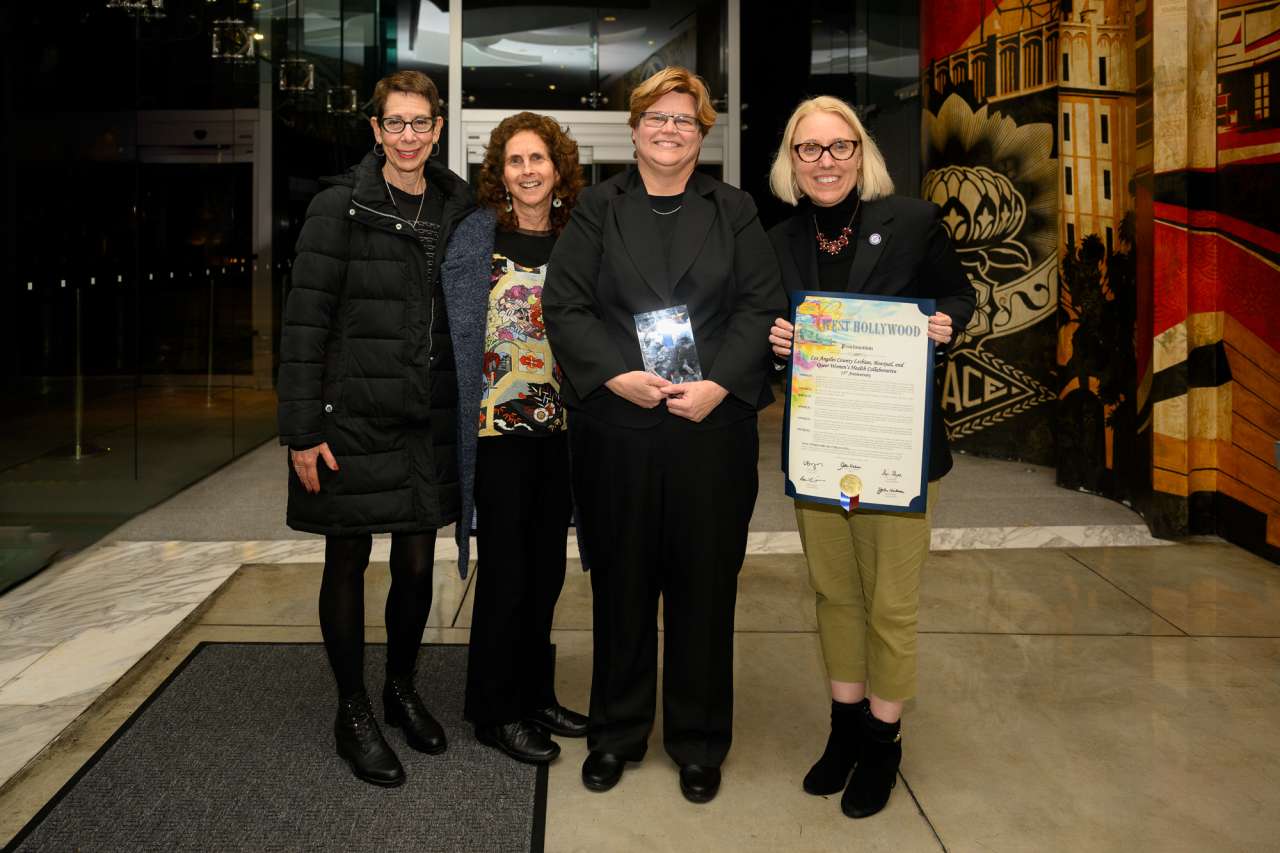In the field of LGBTQ+ health care, funding from the National Institutes of Health for research that include women and individuals who identify as non-binary or gender queer was on the very low end as recently as five years ago.
There’s just one big problem: More than 50% of the LGBTQ+ community identifies as female, non-binary, or gender queer.
It was this glaring inequity that led to the founding of the Los Angeles County Lesbian, Bisexual & Queer Women’s Health Collaborative (LBQWHC) in 2009, and more recently, the UCLA Health Lesbian, Bisexual, and Queer (LBQ+) Health Program, which may be the only one of its kind in the nation. Launched in March, this UCLA Health initiative aims to address the unique health care needs of LBQ+ people through sensitive community engagement and by training more medical providers to provide quality care to this underserved population.
On Jan.22, the West Hollywood City Council recognized the collaborative for its pioneering work in this field. Janet Pregler, MD, Iris Cantor - UCLA Women’s Health Education and Research Center who was instrumental in launching the LBQ+ Health Program at UCLA, represented the collaborative at the meeting acknowledging the council’s valuable financial support for this effort over the past decade.
Dire need for research and training
Dr. Pregler began her career in the 1980s during the AIDS crisis.
“When the medical community at the time started recognizing the need for specialized medical care for members of the LGBTQ community, they started by thinking about men, which was understandable at the time,” she said.
What followed was a long period of time where research around LGBTQ health continued to have a strong focus on men, ignoring 50% of the community who are women or who identify as female, non-binary or gender queer. Dr. Pregler said even the minuscule amount of research that exists in this area addresses the needs of white women; this left out intersectional identities, particularly Latina and Black women as well as female veterans.
In 1999, the region’s medical providers along with Los Angeles County health officials and experts, held a summit that anticipated a lot of the issues that would come up around women’s health care in the next 25 years, including care for LBQ+ women, said Dr. Pregler.

The collaborative, whose work began 10 years after that summit, conducted focus groups that showed the dire need for health care providers to be better trained so they can provide quality care to this population.
“There was an urgent need to train physicians, other healthcare providers, and licensed and unlicensed staff who work in these settings,” Dr. Pregler said. “We absolutely needed to raise awareness.”
The collaborative’s work was well received in different quarters including in the jail system and in faith-based systems that did not offer services to the LGBTQ community. UCLA’s LBQ+ initiative stands on the shoulders of the collaborative and its groundbreaking work, Dr. Pregler said.
Erin Baroni, MD, who leads UCLA Health’s LBQ+ program, said a major contributor for such blatant inequity in this area is a lack of funding. This initiative is trying to fill those gaps so that LBQ+ patients get the health care they need and are often fearful or hesitant to seek, she said.
The program accepts patients on a self-referral basis, Dr. Baroni said, adding that the program aims to be inclusive of those who are female-identifying and/or assigned female at birth (AFAB) and identify as lesbian, bisexual and/or queer. It is also open to anyone who feels the program would be a good fit to address their unique healthcare needs, she said.
Misconceptions and dangerous discrimination
Dr. Baroni, who identifies as a lesbian, can relate to this population and understands the challenges they face based on her own experience not just as a doctor, but also as a lesbian woman trying to access health care.
“Women providers have told me I didn’t need PAP smears, which is incorrect,” she said. “Doctors wrongly assume that lesbians don’t need STD testing or birth control because the assumption is their sex is less risky, or they are not having sex that could result in pregnancy.”
That is a dangerous assumption, and one that leaves many lesbian, bisexual, and queer patients leaving their providers’ offices without receiving the appropriate care for their individual sexual practices, Dr. Baroni said.
“Every lesbian is different, but you get put in this box,” she said. “Programs like ours give the community hope that they will be understood and receive the care they deserve.”
Both Dr. Baroni and Dr. Pregler emphasized that the problem is far worse for women of color.
“Some women speak about the need to choose between culturally competent care and being outed as a lesbian,” Dr. Pregler said.
She gave the example of a woman who may belong to an ethnic minority who might wish to go to a provider who speaks the same language as she does. However, she may be fearful that someone in that medical office would “out” her in her community.
“So many of these complex layers have made it difficult for women to access health care services,” Dr. Pregler said.
Dr. Baroni said the way the LBQ+ program is set up makes it much easier for patients to find a provider and get the services they need. Dr. Pregler reached out to UCLA’s LGBTQ+ champions to see if they would be listed as physicians affiliated with this program. The program currently services about 25 patients and is hoping to serve thousands more as it becomes more widely known in the community.
Unique needs and intersectionality
Loretta Worthington, clinic program manager for the Medical Hubs and for the Gender Health Program with the Los Angeles County Department of Health Services, which is part of the collaborative, said LBQ+ populations increasingly need specialized care that is hard to find. Her partner, for example, is a gender queer, male-appearing person with a female body, who faces immense challenges finding quality health care.
“There are unique health disparities that apply to people who are gender diverse,” she said. “For example, someone may have sexual encounters with a variety of genders, but identify as lesbian. As a queer-identified woman, I can’t remember any providers ever asking me specific questions about my sexual behavior, which are absolutely necessary, if you are going to treat a person from this population.”
Worthington says 1% of all philanthropic funding in the U.S. in 2010 went to LGBTQ issues and 0.01% went to women in the community. Transgender people, particularly those of color, she said, are most frequently excluded from research.
Alison Cerezo, PhD, researcher at the UC Santa Barbara’s Social and Health Equity (SHE) Lab, said queer, transgender women and nonbinary people need health services uniquely built to meet their needs, but they often find themselves “fit into the services that were never developed for them.”
“Having a clinic just for them is incredible because it gives women access to culturally aligned and thoughtful services,” they said of the UCLA LBQ+ program. “It creates a ripple effect where women can have more open conversations with family and friends, which will bring more women into health care services. Women face discrimination and avoid accessing health care because they know they will experience discrimination.”
Women need to be “able to bring all of themselves to the table,” Dr. Cerezo said.
“There is all kind of intersectionality in this population,” they said. “They may face financial stressors, or may be uninsured or undocumented. Providers need to be sensitive to women’s pronouns and gender presentation. Women need to be able be themselves, freely, knowing they have a provider who is not going to judge them.”
Plenty of room for growth
Another challenge is access to mental health services, Dr. Baroni said.
“LBQ+ community members are disproportionately affected, especially when you look at racial or ethnic intersections,” she said. “Any program we have must include a mental health component. Although sometimes the challenge in this regard is rooted in the toxic cycle of being othered.
“While trying to provide these services, we should also not assume right off the bat that a person in this population is going to have mental health issues. That’s the other side of the coin.”
Dr. Baroni said she would like the program to continue to grow and include components that are still missing such as social services and nutrition counseling. She says weight-related issues and eating disorders tend to be more prevalent in the LBQ+ community.
Representation is also crucial, she says.
“There is no question that if I have a provider who represents me in some way, I feel more comfortable,” Dr. Baroni said. “This has been personally rewarding for me. I connect with patients on common struggles we’ve encountered. When folks feel their providers represent them, they do get better care.”




